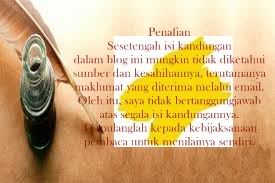-
من الأيات القرآن الكريمة
Jom Ikut Mee Udang....
Friday, August 13, 2010
Ramadan 2010 Special
The Month of Ramadan
The month of Ramadan is a great month. It is the month in which Allah revealed the Quran as a guidance for the whole of mankind. It is the month in which Allah gave the Muslims victory in their first and greatest battle at Badr. It is the month which has Laylat al-Qadr, a night which is better than a thousand months.
In Ramadan the gates of heaven are opened and the gates of Hell are shut, and the shayaateen (devils) are tied up and the reward for good deeds, acts of charity and acts of worship are multiplied in this month.
Definition of Fasting
Fasting means abstaining from several things, from just before the starting of dawn (i.e. just before the start of Fajr) until sunset, with the intention of fasting.
A Muslim fasting must abstain from the following
* Food and Drink
* Sexual intercourse
* masturbation (most scholars say this not allowed even when not fasting)
If these three things listed above are done deliberately a persons fast will be broken.
Who Must Fast?
Allah has made fasting the month of Ramadan obligatory upon every adult, sane, settled (i.e., not travelling) Muslim who is able to fast and has nothing such as hayd [menstruation] or nifaas [postnatal bleeding] to prevent him or her from doing so.
Why Do Muslims Fast In Ramadan?
It has been enjoined on us so that we may become pious. A pious Muslim and Muslimah does whatever Allah and His Messenger have told them to do. Allah says (interpretation of the meaning):
"O you who believe! Observing As-Sawm (the fasting) is prescribed for you as it was prescribed for those before you, that you may become Al-Muttaqoon (the pious)? [al-Baqarah 2:183]
And Allah says in a hadeeth qudsi: "Fasting is for Me and I will reward for it. He gives up his desire and his food and drink for My sake." Narrated by al-Bukhaari, 7492; Muslim, 1151.
The purpose of fasting is not to just get hungry and thirsty but it is to become pious. So one should stay away from Un-Islamic things such as:
* Getting angry
* Using Bad language
* Back biting and gossip
* Arguing and fighting with Muslims.
* Being rude and impolite
* Looking, touching , flirting with non-mehrems of the opposite sex.
* lying and cheating
* Engaging in riba (interest, usury)
* women non wearing Hijab
* men shaving beards and having cloths below ankles
* allying with the enemies of Islam against the Muslims
* promoting Un-Islamic ideologies such as democracy and socialism.
* basically staying away from anything that is Haram.
*
Prophet (peace and blessings of Allah be upon him) said: "Whoever does not give up false speech and false actions and ignorance, Allah has no need of his giving up his food and drink." Narrated by al-Bukhaari, 6057.
He also (peace and blessings of Allah be upon him) said: "A fasting person may get nothing from his fast except hunger and the one who prays at night may get nothing from his qiyaam but a sleepless night." Narrated by Ibn Maajah, 1690; classed as saheeh by al-Albaani in Saheeh Ibn Maajah.
- The reward for fasting is immense, as mentioned in the following Hadeeth :
"Every action of the son of Adam is given manifold reward, each good deed receiving then times its like, up to seven hundred times. Allah the Most High said, 'Except for fasting, for it is for Me and I will give recompense for it, he leaves off his desires and his food for Me.' for the fasting person there are two times of joy; a time when he breaks his fast and a time of joy when he meets his Lord, and the smell coming from the mouth of the fasting person is better with Allah than the smell of musk." [al-Bukhaaree]
Also, Sahl ibn Sa`d said that the Prophet (peace be upon him.) said: "Indeed there is a gate of Paradise called ar-Rayyaan. On the day of Resurrection those who fast will enter through it; no one enters it except for them, and when they have entered, it is closed so that no one enters it, so when the last of them enters it, it is closed, and whoever enters it drinks, and whoever drinks never becomes thirsty." [Ibn Khuzaimah, Saheeh].
- Fasting is a shield against the Fire:
"Fasting is a shield with which a servant protects himself from the Fire." [Ahmad, Saheeh]
- On the Day of Judgment, "Fasting will say: O My Lord I prevented him from food and desires so accept my intercession for him." [Ahmad, al-Haakim and Abu Nu'aim, Hasan]
- Fasting is a means for one's sins to be forgiven. The Prophet (peace be upon him.) said: "He who fasts Ramadan, due to Iman and hoping for reward (from Allah) then his past sins are forgiven." [al-Bukhaaree, Muslim]
- The supplication of the fasting person is answered:
"There are in the month of Ramadan in every day and night those to whom Allah grants freedom from the Fire, and there is for every Muslim a supplication which he can make and will be granted." [al-Bazzaar, Ahmad, Saheeh]
How to Fast and rulings regarding fasting
1 The Intention
It is obligatory for the fasting person to confirm his/her intention before the appearance of fajr. The Prophet (peace be upon him) said "He who does not resolve to fast before it is fajr, then there is no fast for him" (Abu Dawood)
Prophet (peace and blessings of Allaah be upon him) said: "Whoever does not intend to fast before dawn, there is no fast for him." Narrated by al-Tirmidhi, 730. According to a version narrated by al-Nasaa�i (2334): "Whoever does not intend to fast from the night before, there is no fast for him." Classed as hasan by al-Albaani in Saheeh al-Tirmidhi, 573.
The place of intention is the heart and to utter it verbally is not established from the Prophet (peace be upon him) or his companions, may Allah be pleased with them. Thus one should make intention in ones heart before going to sleep.
2 The time for beginning and ending the fast.
i ) There are two types of fajr:
-False fajr and True fajr
a) False Fajr, At this time it is unlawful to pray fajr prayer but it is permissible to eat for the one intending to fast. The false fajr is distinguished by a rising vertical column of whiteness which appears like the tail of a wolf
b) True fajr. At this time it is lawful to pray the fajr pray but is it unlawful to eat for one who is fasting. It is distinguished by a white light coming across the horizon in the East ,
Thus one should stop all eating and drinking before the True fajr.
ii) The meal that is taken before the fajr is called Suhoor (predawn meal)
We should make sure that we eat and drink something at Suhoor, and that we delay it until just before the adhaan of Fajr.
The Prophet [an error occurred while processing this directive] (peace and blessings of Allah be upon him) said "The distinction between our fasting and the fasting of the people of the book is the taking of the pre -dawn meal (Suhoor)" (Muslim)
The Prophet (peace and blessings of Allah be upon him) said: " Have Suhoor, for in Suhoor there is blessing (barakah)." (Reported by al-Bukhaari, Fath, 4/139)
"Suhoor is blessed food, and it involves being different from the people of the Book. What a good Suhoor for the believer is dates." (Reported by Abu Dawood, no. 2345; Saheeh al-Targheeb, 1/448).
He (peace be upon him) also said "The Suhoor is a meal of blessings, so do not leave it, even if one of you takes just a gulp of water, since Allah sends mercy and His angels seek forgiveness for those who take Suhoor" (Ahmad)
It is also guidance of the Prophet (peace be upon him) to delay the Suhoor meal until just before the true fajr. (note along with no eating or drinking whilst fasting. one can not have sexual intercourse with spouse. kissing and hugging is allowed but if such close contact causes ejaculation then this will break the fast. Also swallowing saliva of some one else invalidates the fast.
3 The time to breaking the fast (Iftar).
This time is as soon as Maghrib Starts (after sun has set). If you are in the Masjid or close by and hear the Athan for Maghrib prayer then it means you can now break your fast.
One should hasten to break the fast because the (peace and blessings of Allah be upon him) said: "The people will be fine so long as they do not delay iftaar." (Reported by al-Bukhaari, Fath, 4/198). He (peace be upon him) also said "My Ummah will not cease to be upon my Sunnah as long as they do not await the stars when breaking the fast" (Ibn Hibban). So as soon as Maghrib begins (i.e. if you are in the Masjid and Athan is said) one should start to break the fast immediately.
Break the fast in the manner described in the hadeeth narrated by Anas (may Allah be pleased with him): "The Prophet (peace and blessings of Allah be upon him) used to break his fast with fresh dates before praying; if fresh dates were not available, he would eat (dried) dates; if dried dates were not available, he would have a few sips of water." (Reported by al-Tirmidhi, 3/79 and others. He said it is a ghareeb hasan hadeeth. Classed as saheeh in al-Irwa?, no. 922).
Ramadan 2010 Special
2010-08-13T18:31:00+08:00
Restoran Mee Udang D' Tanjung
Dakwah|
Subscribe to:
Post Comments (Atom)




























Post a Comment
Komen Anda